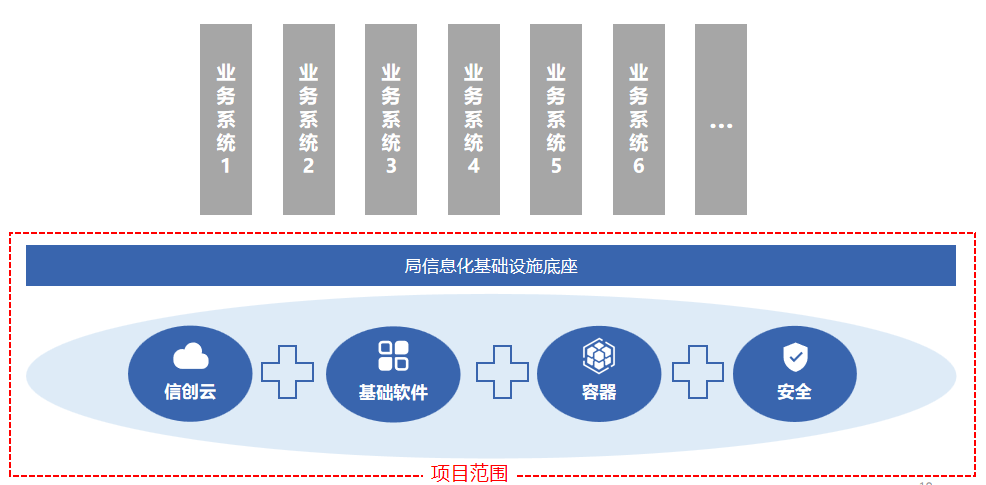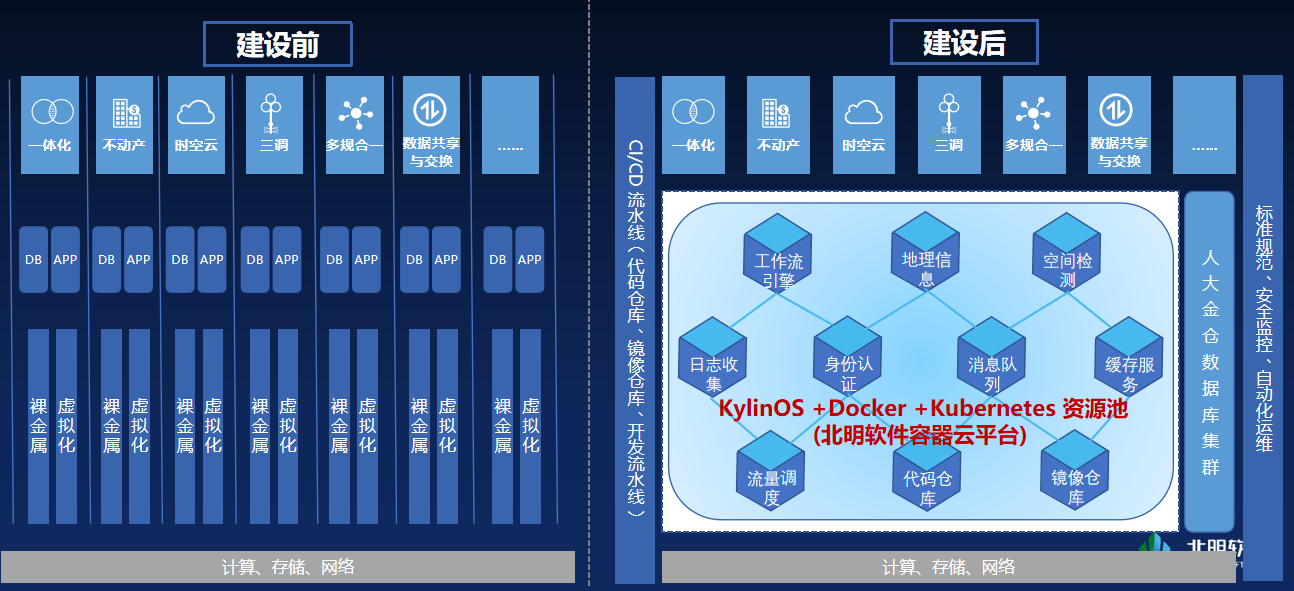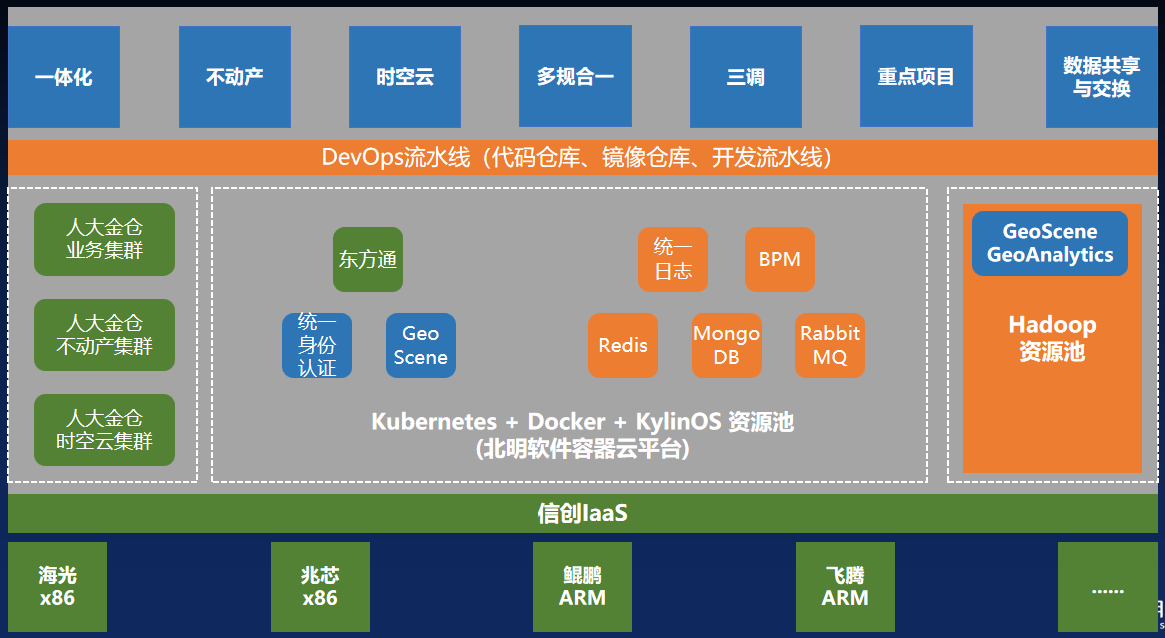

E-government, finance, enterprise, etc.

In 2021, the committees, bureaus and offices in Guangzhou Municipality began the process of transforming their business systems in the information technology application innovation industry (ITAII) transformation efforts. Domestic ITAII hardware devices had a gap in computing power compared to X86 devices. The original business systems could operate normally only in the ITAII-specific environment, leading to inefficient resource utilization. By adopting a cloud-native architecture, applications can dynamically allocate and release resources based on actual needs, achieving flexible scaling, significantly improving hardware resource utilization, and partially reducing the computing power gap between domestic ITAII hardware devices and X86 devices. Beiming Container Cloud, built on open-source cloud-native technologies, added multiple scenario interfaces to E-government systems, including identity authentication, GIS software, and log aggregation. This made it more suitable for transforming the ITAII systems in municipal committees, bureaus and offices and also easier for developers and users to use and maintain.

Highlight 1:Elasticity and scalability
The Beiming Container Cloud uses large-scale container orchestration, scheduling, and optimization technologies to maximize the computing power of domestic CPUs and meet high computing power needs. Applications can dynamically allocate and release resources according to actual needs, enabling elastic scaling. When the traffic peaks, the system can automatically increase computing resources to meet user demands; when traffic is low, it can automatically reduce resources to lower costs.
Highlight 2: Containerization and microservice architecture
The Beiming Container Cloud fully adopts the microservice architecture to improve the efficiency of application adaptation and transformation. By decomposing application components into independent containers, environment isolation and dependency decoupling are achieved. Containerization allows applications to run in different environments, making it easier to migrate from development to test and then to production. In addition, the Beiming Container Cloud adopts a microservices architecture that can split complex applications into multiple independent microservices, each of which focuses on specific functions and can be deployed and scaled independently.
Highlight 3: Automation and continuous delivery
The Beiming Container Cloud provides automation and continuous delivery capabilities. By automating deployment, configuration, and management, it reduces manual operation errors and costs while improving system reliability and stability. The continuous delivery practices drive development teams to integrate, test, and deploy code frequently, enabling rapid software delivery and feedback loops.
Highlight 4: Establishing development standards
Based on business scenarios that have been implemented, the Beiming Container Cloud has established a set of development standards adapted to domestic databases. These development standards help developers avoid pitfalls, improve development efficiency and code success rates, and assist developers in better managing different development practices and formulating user management policies.



The Beiming Container Cloud Solution is compatible with various domestic platforms such as Kunpeng, Phytium, and Hygon, as well as X86 non-domestic platforms, offering strong compatibility and wide applicability. Currently, the Beiming Container Cloud services have been included in the Guangzhou Municipal Government Informatization Cloud Service Platforms Procurement Catalog, providing leasing services to all governmental committees, bureaus and offices in Guangzhou Municipality. It is expected to achieve a cumulative revenue of 20 million yuan from 2023 to 2024.

Scenario 1: ITAII transformation and integration project
Beiming, leveraging its integration experience, provides users with a complete set of transformation solutions for all ITAII systems, including hardware foundation based on the ITAII architecture, basic software architecture planning, network planning, security planning, and support for business system developers in code adaptation and performance tuning. By utilizing the Beiming Container Cloud Platform Solution technology, a PaaS platform based on large-scale container technology has been built for users. While adapting to government scenarios, this platform leverages the ITAII cloud resources to meet high computing power demands of users’ business scenarios. Through mechanisms like flexible scaling, automatic health checks, and disaster recovery, it provides PaaS services such as continuous development and integration, automated operation and maintenance that meet classified protection standards.
Scenario 2: Service leasing
The Beiming Container Cloud, already used as Guangzhou Municipality's government cloud and ITAII cloud, offers container service to external parties through leasing. Utilizing Beiming's self-operated government cloud and ITAII cloud platforms, the resources and technologies of Beiming Container Cloud Platform are leased to external parties. Various committees, bureaus and offices in Guangzhou Municipality have been using the Beiming Container Cloud resources directly through cloud resource leasing.

Guangzhou Municipal Planning and Natural Resources Bureau: ITAII Core System Transformation Project
Guangzhou Municipal Human Resources and Social Security Bureau: Container Resources Leased for the ITAII Transformation Project
Guangzhou Municipal Road Affairs Center: ITAII System Transformation Project